Christian in the World
The Christian in the World lecture series, sponsored by Mount Angel Institute, is an integrated program of study, prayer and discussion for Christians who want to live their faith more deeply. The program seeks to help participants gain a more profound understanding of the Scriptures and the Church, and to support lay people in exploring how to live their baptismal vocation in everyday life.
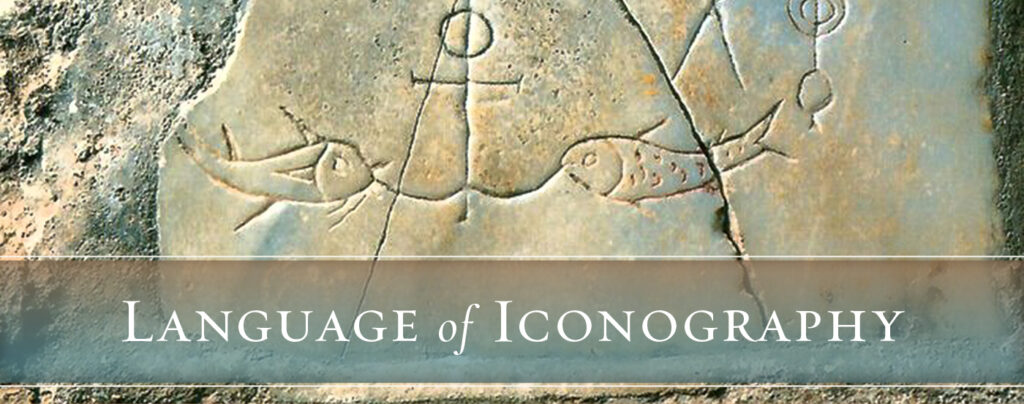
Winter/Spring 2025 Christian in the World
with Christine Schlesser, Director of the Classical Iconography Institute
February 22 | March 22 | April 12 | May 17
9:15 am – 11:45 am | Mount Angel Library
From underground symbols to sacred windows, early Christian catacomb art used icons to convey the word of God. This four-part series introduces the earliest Christian symbolic art that evolved to convey the theology of the Church using the visual language of iconography. We’ll learn how to translate the iconographic language of color, symbolism, and gesture to understand the icon’s encoded message, discuss the performative effect of iconography on becoming an icon of God, and learn how the many beautiful iconographic depictions of Mary invite us to prayer.
Tickets
Underground Symbols of Christianity
February 22 | 9:15–11:45
Join us for an exploration of how early Christian symbols developed during the age of persecution and the early Church. How did those early Christian images develop into the symbols we understand today?
How Signs & Symbols Speak in Icons
March 22 | 9:15–11:45
What do the positions of figures, colors, gestures, and symbols mean when encountering icons and Christian art? Join us to learn how to read an icon and discover how artwork can be a revelation of the mystery of God.
Becoming an Icon of God
April 12 | 9:15–11:45
Join us for a panel discussion with various individuals from different walks of life—iconographers, artists, and monks! Together, they will explore the idea of how one becomes an “Icon of God.”
Iconographic Faces of Mary
May 17 | 9:15–11:45
Mary, the mother of God, plays a central role in Christian art, and is portrayed in various ways. What do her faces reveal to us believers? Join us to explore the figure of Mary in the artistic and iconographic tradition of the Church! Various art and icons of Mary will also be displayed in the library foyer during this time.
Christian in the World archives
-
Celebrating and Adoring Christ in the Sacrament of the Eucharist
Fall 2024 Lecture Series 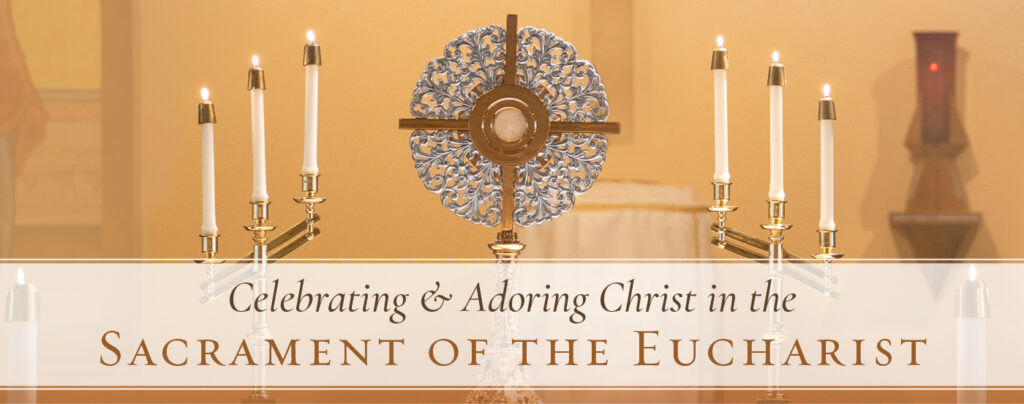
On the feast of Corpus Christi in 2022, the United States Conference of Catholic bishops initiated a three-year National Eucharistic Revival. In July of this year, the project reached its climax at the Eucharistic Congress held in Indianapolis. The Congress launched the final year of the Eucharistic Revival as a “Year of Mission,” sending those who attended to go out from the Congress to bring Christ to their home parishes.
Mindful of this “Year of Mission,” our Christian in the World’s fall series, “Celebrating and Adoring Christ in the Sacrament of the Eucharist,” is dedicated to deepening awareness and appreciation of Christ’s saving presence in the Eucharist as it is celebrated at the altar, and as he is adored in the tabernacle. The objective is to contribute to the bishops’ Eucharistic Revival project in our own small corner of the World.
Cardinal Hume on the Eucharist:
“Did not our hearts burn within us as we listened to him speaking?”
Sister Gertrude Feick, OCSO
September 14 | 9:15–11:45
Mount Angel LibrarySister Gertrude is known to many CITW patrons from the fine presentations she gave in years past, when she was still working on her thesis, a study of Cardinal Basil Hume. Having completed it, she will offer a reflection on Cardinal Hume’s Eucharistic spirituality. She writes: “The working title for my presentation is ‘Cardinal Hume on the Eucharist: Did not our hearts burn within us as we listened to him speaking.’” Her presentation will set the tone for the entire series: ought not our hearts burn when we recognize him in the ‘breaking of the bread’?
Understanding What Happens at Mass
Abbot Jeremy Driscoll, OSB
October 19 | 9:15–11:45
Mount Angel Library
We will look at four parts of the Mass, understanding their relationship and flow: from the Liturgy of the Word, to the bringing of gifts of bread and wine to the altar, through the Eucharistic Prayer and what is effected there, and in this light come to understand some of what it means to receive Holy Communion in this context.”
Exploring the Real Presence
Abbot Peter Eberle, OSB
November 9 | 9:15–11:45
Mount Angel Library
The objective of this presentation will be to discuss (in non-technical terms) a history of the controversies concerning the Real Presence as well as to discuss what are some of the ethical implications of the Real Presence for the Christian life.
Eucharistic Transformation: Desire, Liturgy, and Purification
Br. Anselm Flores, OSB
December 14 | 9:15–11:45
Mount Angel Library
What is the greatest Eucharistic miracle? More than what we commonly know as “Eucharistic miracles,” the greatest miracle is that we are transformed into what the Eucharist signifies: the true presence of God. But how does this come about and where is the place where this transformation occurs? This presentation will examine the key notion of desire – often misunderstood in contemporary society – and its transformation and purification within the liturgy, the place and the means by which we “put on Christ” and become what we were destined to be.
-
The Christian in the World & Monastic Spirituality
Winter 2024 Lecture Series 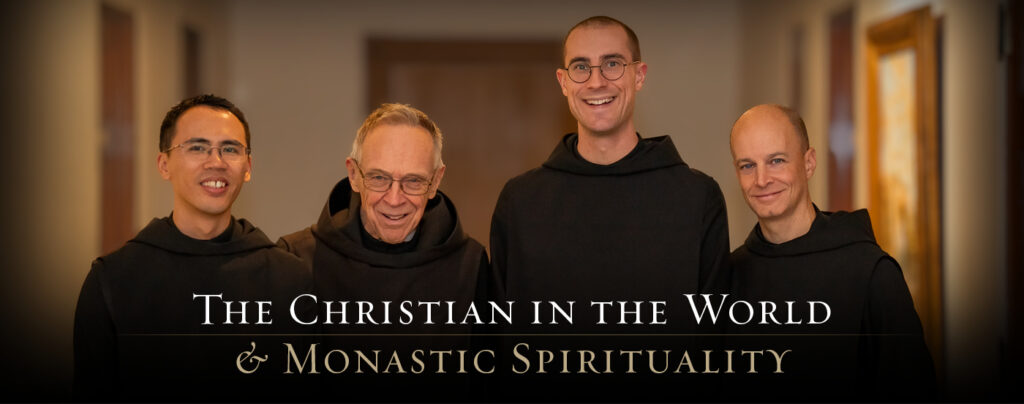
A four-part series led by Fr. John Paul Le, OSB, Abbot Peter Eberle, OSB, Br. Ambrose Stewart, OSB, and Fr. Michael Shrum, OSB.
Unsurprisingly, monks are practitioners of monastic spirituality. Might a monk’s spirituality have a broader reach, even being relevant for a Christian in the world? This was the topic of the winter/spring 2024 series.
January 27, 2024
What is monastic spirituality?
Led by Br. Ambrose Stewart, O.S.B.Monastic spirituality as a guide for life for every person is the theme for the winter/spring 2024 Christian in the World series. The first lecture is titled, “What is monastic spirituality?” The focus is on the Desert Fathers – those 3rd and 4th century monks who first fled to the Egyptian desert in search of God.
The first half of the lecture considers the life of Saint Antony, “the father of all monks,” and the collected Sayings of the Desert Fathers. In the second half, we look at Saint Pachomius, the father of cenobitic (communal) monasticism, along with Saint John Cassian, whose Institutes and Conferences synthesized the wisdom of the Egyptian desert and transmitted it to the Latin West.
The unifying theme in all of this is Scripture. The desire to radically embody Scripture in their lives consumed these early monks. This desire is just as relevant for Christians in the World today as it was for the 4th century desert-dwellers.
Download PDF file for text to accompany the audio file for What Is Monastic Spirituality?
February 10, 2024
Monastic spirituality: A journey together to everlasting life.
Led by Abbot Peter Eberle, O.S.B.In his talk, “Monastic spirituality: A journey together to everlasting life,” Abbot Peter explains how monastic community life is structured, its purpose, and how learning about the spirituality of community life can help lay people live out their Christian vocation. He will, in part, base his presentation on chapter 72 from the Rule of St. Benedict:
“… This, then, is the good zeal which monks must foster with fervent love: They should each try to be the first to show respect to the other (Romans 12:10), supporting with the greatest patience one another’s weaknesses of body or behavior, and earnestly competing in obedience to one another. No one is to pursue what he judges better for himself, but instead, what he judges better for someone else. To their fellow monks, they show the pure love of brothers; to God, loving fear; to their abbot, unfeigned and humble love. Let them prefer nothing whatever to Christ, and may he bring us all together to everlasting life.”
March 9, 2024
Monastic spirituality: Listening to and praying with God’s voice.
Led by Fr. John Paul Le, O.S.B.In this Christian in the World lecture, Fr. John Paul Le will explore monastic spirituality from the perspective of prayer and how this prayer can enrich the life of a Christian living in the world. The first part of his talk will focus on lectio divina, the ancient monastic practice of prayerfully reading the sacred Scriptures. Throughout the centuries, monks developed this method of reading the Scriptures which can be broken down into four steps: reading, meditation, prayer, and contemplation.
The theme of the second part of the lecture is the Liturgy of the Hours (or Divine Office), the prayer of the Church. St. Benedict calls this rhythm of chanting the psalms and other Scriptures the “Work of God.” Through the Liturgy of the Hours, we unite ourselves to Christ in his eternal prayer to the Father.
April 13, 2024
Monastic spirituality: Reaching out to and being formed by the world around us.
Led by Fr. Michael Shrum, O.S.B.This final presentation in the spring 2024 series, by Fr. Michael Shrum, OSB, explores how monastic spirituality both forms and is formed by the world around us. He traces the movement of the Holy Spirit in the life of St. Benedict and in his disciples, including the pioneer monks who established Mount Angel Abbey. By looking at the history of Mount Angel Abbey and its monks, Fr. Michael shares how the Holy Spirit moves and works precisely in the time and place in which the monk finds himself, and this is a lesson for all Christians living in the world.
-
On Politics and Love: Learning from Shakespeare
Fall 2023 Lecture Series CITW Fall Series 2023
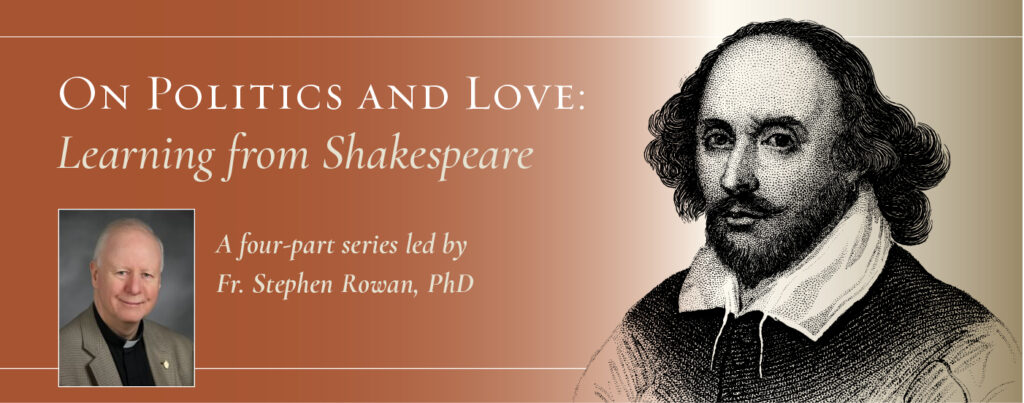
Shakespeare’s plays have held the stage from the time they were written (c. 1590-1610) because people have found that they speak to the heart about topics that concern them deeply.
In Richard III, a history and tragedy, Shakespeare shows how a deeply-flawed man becomes a tyrant and how his conscience – and the consciences of an aroused people – take him down.
In As You Like It, a comedy about people in love, Shakespeare looks beyond clichés and commonplaces to examine how love can hope to avoid the extremes of sentimentality and cynicism in order to survive over time.
The four talks focus on what the wisdom of Shakespeare, one of the world’s greatest dramatists and poets, offers to everyone but especially to people who are Christian in the World.
-
Loving the Church, Loving the Liturgy
Winter 2023 Lecture Series CITW Winter Series 2023
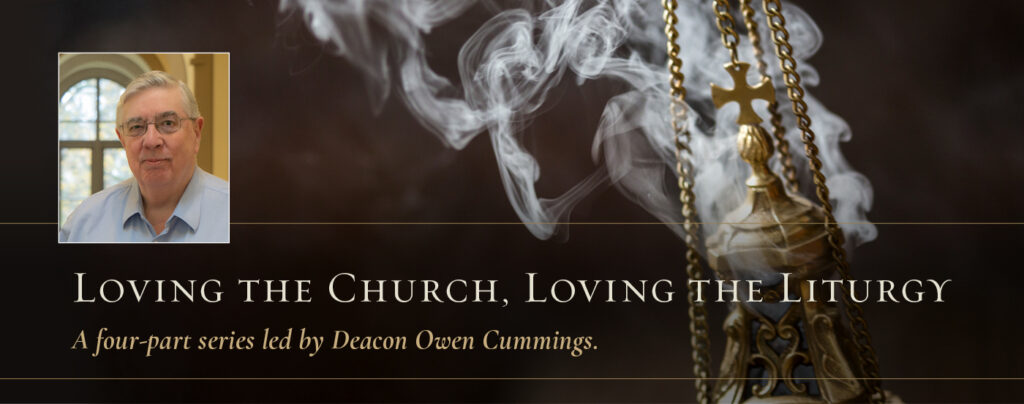
Loving the Church, Loving the Liturgy, presented by Deacon Owen Cummings, was a series of presentations intended to lead participants to a deeper understanding of the Eucharistic liturgy. Deacon Cummings invited participants to take a fresh look at the Church’s renewal initiated by the Second Vatican Council, which firmly places the liturgy at the heart of our lives as Catholics.
The talks considered the following:
- Vatican II at 60
- What is liturgy?
- Pope Francis and the Liturgy
-
Nature Imagery in the Psalms
Fall 2022 Lecture Series CITW Fall 2022
Audio files available online now
The fall 2022 series of Christian in the World, a four-part series by Br. Thomas Buttrick, O.S.B., considered the images of nature found in the psalms.
-
Beauty and the Search for God: A Conversation with Monk Artists of Mount Angel
Spring 2022 Panel Discussion -
The spring 2022 CITW lecture was a live-streamed panel discussion with four monks of Mount Angel Abbey about faith and beauty. Among the panelists are three monk-artists. Fr. Vincent Trujillo is a master calligrapher; Fr. Teresio Caldwell is a musician and composer; Fr. Novice Jack Shrum writes icons and studied under Br. Claude Lane. Our fourth presenter is Br. Anselm Flores, who works with Fr. Nathan Zodrow, the art curator at Mount Angel, and is part of the monks’ art docent program. Moderating the discussion is Br. Thomas Buttrick.
For Benedictines, art and culture are integral to living a fully human, Christian life. Art is what happens when a person or community faithfully lives the Rule of St. Benedict with intentionality. That’s why, says Abbot Jeremy Driscoll, O.S.B., “a monastery feels like something. To be at Mount Angel feels like something. It’s not indifferent what the architecture is like, what art is placed on the walls, what music is chosen for each liturgy. All that constitutes our environment creates a beautiful cultural environment, a unique Mount Angel monastic environment where arts and culture are accessible and to all who come.”
-
A Handbook of Healing: The Therapeutic Value of Benedictine Spirituality
Fall 2021 Lecture Dr. Jeff Thompson, a psychotherapist practicing in Yakima, Washington, and an oblate of Mount Angel Abbey, presents the Fall 2021 Christian in the World program in a three-part video series titled, A Handbook of Healing: The Therapeutic Value of Benedictine Spirituality
We are created to be in the image and likeness of God, yet at some point we realize that we somehow are not quite there. Along the way, we have lost our sense of this self, made to be in the image of God. St. Benedict, in his Holy Rule, offers a path to healing. He tells us, “Return to God.” Through his Holy Rule, St. Benedict provides us a process for our return to wholeness in God.
1. How Did We Get Here? St. Benedict and the Origin of Self
2. Where Are We Now? The Disorders of the Self
3. How Do We Get Where We’re Going? The Repair of the SelfThe original presentation was livestreamed from Mount Angel in the fall of 2021. It is available to replay on the Abbey’s YouTube channel.
-
Developing the Monk Within in a Time of COVID
Spring 2021 Lecture The spring 2021 Christian in the World lecture, Developing the Monk Within in a Time of COVID: What Monastic Life Can Teach Us About Coping, is a panel discussion on how living with COVID-19 restrictions has been, for some, a time to discover their inner contemplative, their “monk within.” Br. Israel Sanchez, O.S.B., moderates the panel discussion with Abbot Peter Eberle, O.S.B., Br. Thomas Buttrick, O.S.B., and Mount Angel oblates Suzanne Kaufmann and Maizie Redner.
The original presentation was livestreamed from Mount Angel on May 8, 2021. It is available to replay on the Abbey’s YouTube channel.
-
Dante’s World and Ours
Fall 2020 Lecture Series The fall 2020 Christian in the World series explores Dante’s Divine Comedy, an allegory about the soul’s development from being stuck in sin to being free. The three lectures, Inferno, Purgatorio, and Paradiso, are presented by Fr. Stephen Rowan, STB, PhD, and are available to view on Mount Angel’s YouTube channel.
Notes from Fr. Stephen Rowan
Dante was a Christian in the World. In his case, it was the world of the 13th-14th century Florence, Tuscany, and northern Italy. His great text, the Divine Comedy, is a window into his world, showing us characters whose actions earned them a place in one of three states of life after their time on earth: Hell, Purgatory, or Paradise.
If that were all it is, the Comedy would be of interest only to antiquarians or curiosity seekers. But the Comedy is also a mirror reflecting into our own times, showing how Christians in the world can find themselves — even now — under conditions that are very much like Hell, Purgatory, or Paradise. Our age, no less than Dante’s, is plagued by avarice, envy, and pride; like Dante, we have seen abuses of power in state and church; we, too, have wondered how we and our society can become “unstuck” from a tangled up state of soul and find a way out.
Dante’s Comedy is a way of speaking — an allegory — about the soul’s development from being stuck in sin to being free; from being lost to finding its true home; from fumbling in the dark to living with love in the light. It is, in the end and all along the way, a hopeful journey.
With a little guidance about Dante’s themes and style of storytelling, the Divine Comedy, which Dante intended to be a saving message for his own time, can serve the same purpose in ours.– Fr. Stephen Rowan
